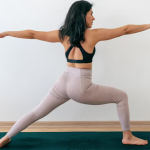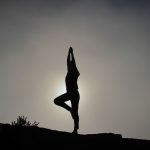Back in lockdown 1.0, we all threw ourselves enthusiastically into our hour of exercise a day. We tuned in to Joe Wickes, we bought bikes, scooters and trampolines in record numbers. And of course, threw ourselves into the plethora of online yoga classes out there.
This time around the mood is slightly less enthusiastic. We know why we’re doing this – Covid has not gone away – but it feels harder. We’re tired, stressed and there’s only so much Zoom a person can take.
So how can we keep up our spirits this Autumn? Well here are TEN excellent reasons to get yourself outside every single day during this lockdown.
1. Connectedness
Working from home can be pretty lonely. 15% of the UK adult population live alone (Office for National Statistics 2018) and those that aren’t working from home are just stuck at home on furlough – again.
Despite the convenience of working from home – the commute couldn’t be easier – it does mean that we lose those little social interactions that make us feel connected to the outside world.
And now that we’ve entered lockdown 2.0 connection is so important. We need to feel connected to other human beings. This isn’t just for fun. Research shows that people with lots of good social interactions are happier, healthier, and LIVE LONGER. So, head outside and smile at your neighbour as you pass by – it’ll do you both a lot of good.
2. Into the Woods
Even in London, we’re never far from woods. If you’re not sure where to head then go to The Woodland Trust for a map of local woods.
You don’t have to be a tree hugger to appreciate the importance of woods. Forests are the lungs of the earth, but as well as their environmental importance, there is scientific evidence to show that being in woods can have a significant positive effect on human health.
Forest Research states that:
Visits to forests can lower blood pressure and pulse rates, and reduce cortisol levels. They can also improve people’s mental, social and physical wellbeing.
In the 1980s the Japanese developed Shinrin-yoku, or ‘forest bathing.’ They found the benefits included lowering blood pressure and cortisol levels, and improving concentration and memory. So take a leaf out of their book and head to the woods.
3. Help the Environment
Instead of driving to the supermarket why not grab a backpack and walk to the shops? We all noticed the quiet in lockdown 1.0 – how birdsong could be heard so clearly and how the roads went quiet (apart from the odd maniac boy racer).
Walking to do your food shop is a way to kill two birds with one stone (as it were), by getting all the immune and health-boosting benefits of a brisk walk, as well as eliminating the carbon emissions your car would have pumped out.
4. Immune Boosting
In the summer we didn’t have common or garden colds and flu to worry about. This time, we do. Heading outside for walks in the winter helps to boost your immune system and keeps colds and flu at bay.
In fact, a chemical released by plants (back to those amazing trees), called phytoncides, has been found to boost the immune system.
Of course, you could always get a flu jab as well, just to be on the safe side.
5. Walk away the Winter Blues
For many people this time of year is hard. SAD (Seasonal Affective Disorder) affects as many as one in three adults in the UK. Due to a combination of lower light levels, a disrupted body clock and lower levels of hormones such as serotonin, SAD can cause a whole host of symptoms, ranging from mild to severe.
The NHS recommends getting as much natural sunlight as possible to alleviate these symptoms, as well as sitting near a window while you work and eating and sleeping well.
6. Noticing Nature
When you’re sitting inside all day it’s easy to miss Mother Nature doing its seasonal thing.
At the moment the leaves are glowing reds, yellows and golds. The light is soft and low. When you head outside every day you notice the small changes as the seasons slowly shift from one to the other.
This immersion in Nature helps to give us a sense of perspective when the world and everything we thought was permanent is changing.
7. Mindfulness while Walking
Yoga isn’t limited to the mat. When you’re outside, the yoga of bringing stillness to the mental chaos – Patanjali’s goal of ‘Chitta vrtti nirodhah’ – can also be achieved. When we do yoga we are connecting our minds and our bodies. When we walk mindfully it has the same effect.
8. Getting fitter
With social activities reduced to a minimum and Zoom exercise classes losing their appeal, the nation’s fitness is at risk this lockdown. The simple act of walking at a brisk pace for 30 minutes each day is enough to keep your weight from going up, to improve the working of the heart and lungs and keep the muscles and bones healthy too.
As you get used to doing 30 mins see if you can increase the amount by 5 minutes every other day. Or see if you can increase the speed of your walking pace. The body adapts to whatever level of exercise you usually do, so it’s good to mix it up a little.
9. Sleep Soundly
Exercise, such as from a brisk walk outside, boosts the body’s natural sleep hormones, such as melatonin.
Being outside, especially in the morning, can help establish a strong circadian rhythm. Circadian rhythms are a natural process that regulate our patterns of sleeping and waking within a twenty four hour period.
If you’re inside in artifical light all day, the body’s internal clock is less able to establish this rhythm, which can disrupt the sleep cycle.
10. Have a Natter
Nothing beats having a chat in person. This lockdown, unlike the last one, we’re allowed to meet up with one other person from another household as long as it’s outside (and not in a private garden). Meeting up with a friend and going for a walk, perhaps grabbing a coffee (takeaway of course) is one of the great pleasures of life.
It doesn’t even have to be a friend, it could even be a family member. Once you’ve bribed your kids to come with you with the promise of hot chocolate, you might find that you have chats that you just wouldn’t have at home.
And if you go on a local walk you might bump into someone you know and have one of those spontaneous chats that makes you feel part of your local community.













